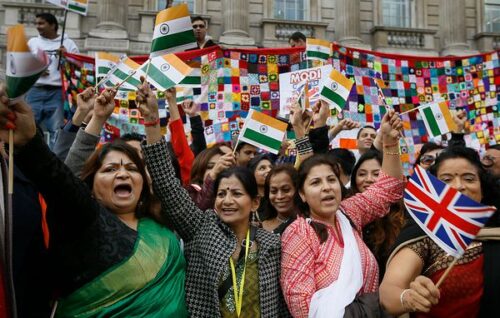Politics, globally, used to have an elite connotation in the past. Not everybody could be a part of a political system although the definition of politics contradicts this very idea. The “learned” people were making decisions about everyone that the “unlearned” were not even allowed to be a part of. Colonialism and Imperialism made this notion more complex by invading the politics of the East and the global South by promoting Western hegemony which empowered the colonisers to take up large spaces of politics in the East and the Global South that did not belong to them. The administration that kept Eastern and Southern civilisations alive and running was found to be faulty and impractical by the Orientalist scholars of the West, which made it easier for the colonisers to influence the tribes and the local people to believe that they might be lacking in political knowledge. Such was also the case of certain South Asian communities who would later become immigrants or the diaspora.
A colonial power in one country found it comfortable to transfer labourers and other workers as indentured labourers to another country (since slavery was abolished) with the same colonial ruler. (Hui & Kambhampati, 2020) If the colonial rulers of the host country were different, then the transfer would be done to strengthen the relations and cordiality between those two colonial rulers. This inherently becomes a political strategy to “improve” the condition of poverty in the colony and to ease administration. These indentured labourers soon became accustomed to the lifestyle of the host countries and were able to adapt to an upgraded but resistive lifestyle than they had in their home country, hence the imposition of indentured labour soon progressed into wilful immigration adding more to the diasporic population and narrative. They came as traders, labourers, students, and so on. They were able to integrate with the culture of the host country and in some cases even assimilate into it. (Gautam, 2013). They sustained themselves by retaining their original cultural, religious and ethnic identity by forming self maintained organised associations in their home countries. (Gautam, 2013). However, this happened much later when colonisation was receding.
The indentured labourers saw violence, abuse and misuse of their labour by the colonial governments. (Dow, 2023). They had just hoped for a better living situation but much to their dismay, the colonisers never wanted it to be that way. It soon became a humanitarian crisis for the home country, for example, as stated by Dow (2023), “Indian Nationalists saw indenture as a humanitarian crisis which not only affected the individual lives of the indentured workers but also undermined the position of India and Indians within the British Empire more generally.” Hence, it becomes inherent that they were treated poorly and were given no importance in the context of political matters.
Yet, on the other hand, recent decades have seen a rise in the political power and influence of the diaspora in their host countries (with special emphasis on the Indian diaspora personalities) that eventually has led to a sort of symbiotic relationship between the home and the host country. How does one explain this trend? Why do Indian immigrants and their offspring succeed in Western systems that are designed to assist locally born and educated Westerners? One plausible explanation is Indians’ acquaintance with English, which stems from two centuries of British colonialism. But language alone does not ensure success. In any event, this does not explain Indians’ success in non-Anglophone European countries.
In Germany, for example, 58% of Indian-origin workers have professions that need a university degree or equivalent expert skills. Another possibility is that Indian immigrants are more driven. That is correct, although Indians appear to surpass other immigration groups. Among the many nations and ethnicities in the United States, persons of Indian heritage have long held the fortunate distinction of earning and retaining the greatest per capita income. First-generation Indian emigrants grew up without taking riches for granted, overcoming obstacles such as limited resources, stringent government regulation, and bureaucratic sloth. Most people have either experienced or witnessed enough deprivation to want to avoid it. They possess the “fire in the belly” that many Westerners, raised in freer, more prosperous homes, may have lost.
Furthermore, India’s history and pluralism have introduced Indians to individuals from other languages, religions, and civilizations. Adapting to the “other” is a deeply entrenched behaviour. As a result, Indian emigrants will feel quite at home working for multinational firms. Growing up in an environment of democracy has provided Indian-born professionals with habits and values like individual initiative, logical thinking, and autonomy in expression, all of which are valued in the business sector. In the meantime, respect for hierarchies allows Indians to be perceived as original and creative while remaining “safe,” rather than dangerous or revolutionary- a mix that aids their integration into their new societies and advancement inside enterprises.
Similarly, India’s support of diversity and condemnation of excess facilitates Indians’ adaptation to competitive circumstances. Indians benefit from a culture that values education and learning, tightly knit families, and an excellent work ethic. Most Indians coming from middle class families presumably grew up seeing excellence honoured and aspiring to receive similar recognition. When such exchanges do not occur (sometimes over many generations), but individuals continue to identify with their homeland and co-ethnics overseas, the result is a diaspora. In this way, while not all diasporas are transnational communities, transnational communities do emerge within them. Today, technology makes it much easier for organisations to function as transnational communities to maintain their identities and mobilise politically. Staying in contact has become more economical because of low-cost plane travel and phone calls, the Internet, and satellite TV. Indeed, the rise of diaspora-related websites demonstrates the strength of shared interests and identities. Diasporic identifications might be various, depending on the criteria utilised. The same person may regard herself as a member of a global Hindu population or a dispersed group of Swaminarayan (sect), Indians (nation-state), Gujaratis (state or language), Patidars or Patels (caste and sub-caste), Suratis (dialect and region), or peasants. These are not mutually exclusive. Furthermore, any of a person’s identities can be dormant or active transnationally. (Vertovec, 2005).
An example in this context of Indian Diasporic people rising to power in their host country is that of Mauritian PM Pravind Jugnauth and the diasporic diplomacy exhibited to Indians residing in Mauritius by the Indian government. Diasporic diplomacy, as exemplified by the case of India and Mauritius involves leveraging the cultural, historical, and socioeconomic ties between diaspora communities and their countries of origin to strengthen bilateral relations, foster mutual understanding, and promote shared interests. In the context of India and Mauritius, the care India has towards the Indian diaspora plays a significant role in enhancing diplomatic relations through various channels, including cultural exchanges, educational cooperation, and people-to people contacts.
One notable aspect of diasporic diplomacy between India and Mauritius is the exchange of high-level visits between political leaders. For example, Prime Minister Pravind Jugnnauth’s visits to India, including his attendance at the Pravasi Bharatiya Divas and other official events, highlight the close ties between the two countries and underscore their commitment to strengthening bilateral cooperation. Similarly, President Ram Nath Kovind’s state visit to Mauritius marked the 50th anniversary of Mauritius’s independence and reaffirmed India’s support for the country’s development and prosperity. Cultural diplomacy also plays a crucial role in India-Mauritius relations, with initiatives such as the establishment of the Indira Gandhi Centre for Indian Culture and the organization of cultural exchange programs and events.
These activities not only showcase India’s rich cultural heritage but also deepen the cultural bonds between the two countries and contribute to promoting mutual understanding and friendship. India’s assistance in the establishment of educational and cultural institutions in Mauritius, such as the Mahatma Gandhi Institute and the Rabindranath Tagore Institute, reflects its commitment to promoting Indian culture and education abroad. These institutions serve as hubs for academic exchange, research collaboration, and cultural dialogue, fostering greater cooperation and goodwill between India and Mauritius. India’s support for development projects in Mauritius, such as the Metro Express Project and the construction of healthcare facilities and educational institutions, demonstrates its commitment to enhancing the socioeconomic development of the country and improving the lives of its citizens. These projects not only contribute to infrastructure development but also create opportunities for economic growth and employment generation, further strengthening the bonds of friendship and cooperation between the two nations.
Hence, the Diaspora is unique to India. Residing in various locations, its members have achieved extraordinary success in their chosen professions by unwavering dedication and hard effort. Furthermore, they have maintained emotional, cultural, and spiritual ties to their native land. This strikes a positive chord in the hearts of Indians. (Vertovec, 2005). In conclusion, the trajectory of the political status of the diaspora, exemplified by the case of Mauritius and its Indian diaspora, reflects a journey from historical marginalization and exploitation to contemporary prominence and influence. Through diasporic diplomacy and concerted efforts to nurture cultural, educational, and economic ties, India and Mauritius have forged a robust partnership that benefits both nations and strengthens the global Indian community. As diaspora communities continue to thrive and contribute to their host countries’ political, economic, and social fabric, their political status and influence will likely continue to evolve, shaping the dynamics of global governance and international relations in the years to come.
References
Dow, L. (2023). Indentured workers and Anti-Colonial resistance in the British Empire. The Gale Review. https://review.gale.com/2021/05/25/indentured-workers-and-anti-colonial-resistance-in-th e-british-empire/
Gautam, M. K. (2013). Indian Diaspora: Ethnicity and Diasporic Identity, CARIM-India RR 2013/29, Robert Schuman Centre for Advanced Studies, San Domenico di Fiesole (FI): European University Institute.
Hui, N., & Kambhampati, U. (2020). The Political Economy of Indian Indentured Labour in the 19th Century [Discussion Paper, University of Reading]. https://www.reading.ac.uk/web/files/economics/emdp202016.pdf
Vertovec, S. (2005). The political importance of diasporas. migrationpolicy.org. https://www.migrationpolicy.org/article/political-importance diasporas


Leave a Reply